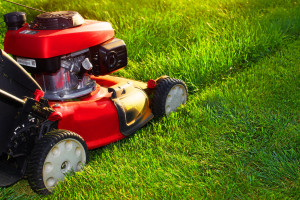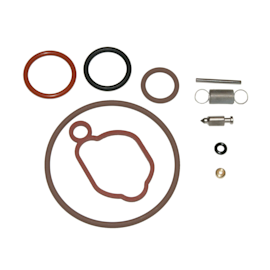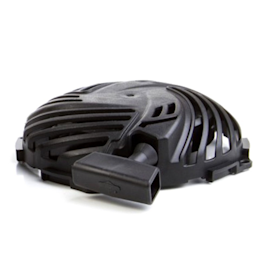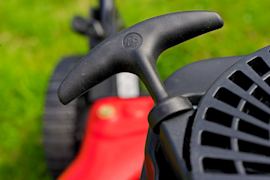How to remove a lawn mower blade using a removal tool


Replacing a damaged or dull mower blade is easier—and safer—when you use a blade removal tool. This video shows you how to use the tool so the blade doesn’t move when loosening or tightening a blade bolt on a walk-behind or riding lawn mower.
If your mower needs more than just a new blade, check out our DIY repair help for riding mowers and push mowers. You’ll find symptom advice, troubleshooting videos, repair guides and maintenance articles to get your mower in good working condition.
Hi, this is Wayne from Sears PartsDirect. If you’ve put off changing or sharpening your lawn mower blade because removing the blade is a pain, this video is for you. We’ll show you how to use a blade removal tool to make the job easier and safer.
The tool, sold on SearsPartsDirect.com, is a clamp that holds the blade in place while you loosen and tighten the blade bolt on walk-behind or riding mowers. Sure, a block of wood between the mower deck and the blade can work in a pinch. But the wood can slip and let the blade to move, making it harder to remove the blade bolt.
That won’t happen with the blade removal tool. The clamp holds the blade securely in place, making it safer and easier to remove the bolt.
How to use the blade removal tool
Follow the owner's manual instructions for preparing the mower for blade removal.
For walk-behind mowers, drain the gas tank, disconnect the spark plug wire and tilt the mower.
For riding mowers, disconnect the spark plug wire and remove the mower deck.
Place the blade removal tool over the blade and the side of the mower deck.
Tighten the clamping screw onto the mower deck firmly so the blade removal tool doesn’t move as you remove and replace the blade.
Remove the blade bolt and pull off the blade.
Install the new blade and tighten the blade bolt. Some manufacturers recommend torquing the blade bolt to 40-50 ft.-lbs. Check your owner’s manual for the blade bolt torque specification. If the manual doesn’t specify torque, tighten the blade bolt firmly.
Loosen the clamping screw and take the blade removal tool off the mower deck.
Reassemble the mower according to the owner's manual instructions.
If you don't have a blade removal tool, get one from Sears PartsDirect the next time you order a mower blade. Search “lawn mower blade removal tool” or part number 490-850-0005.
We hope this video helps you out today. Find more DIY tips in the repair help section of our website or on the Sears PartsDirect YouTube channel.
Symptoms for gas walk-behind mowers
Choose a symptom to see related walk-behind mower repairs.
Main causes: damaged cutting blade, loose cutting blade, damaged flywheel key, engine needs tune up…
Main causes: uneven wheel height settings, damaged wheel, dull or damaged cutting blade…
Main causes: engine needs tune up, dirty or clogged carburetor, damaged flywheel key…
Main causes: drive control cable failure, worn or broken drive belt, bad transmission, broken drive wheel…
Main causes: stale gas, engine needs tune up, bad spark plug, dead battery, bad recoil starter, faulty safety switch, ba…
Main causes: dirty carburetor, bad spark plug, clogged air filter, engine choke problems, clogged gas cap vent…
Repair guides for gas walk-behind mowers
These step-by-step repair guides will help you safely fix what’s broken on your walk-behind lawn mower.

How to rebuild a lawn mower carburetor
The carburetor mixes air with fuel to drive the piston. Rebuild the carburetor if it's clogged or leaks.…

How to replace a lawn mower recoil starter on an OHV engine
Replace the recoil starter if it doesn't move when you pull the starter rope.…

How to replace a lawn mower wheel
Learn how replace a damaged wheel on a walk-behind lawn mower—it's a quick, easy fix.…
Articles and videos for gas walk-behind mowers
Use the advice and tips in these articles and videos to get the most out of your walk-behind lawn mower.

Learn about all the convenient features on our Sears PartsDirect website that make your parts purchases easier.…

Get answers to frequently asked questions about Sears and Sears PartsDirect.…

A blade obstruction, bad recoil starter or locked-up engine can prevent the pull cord on your mower from working. See ho…